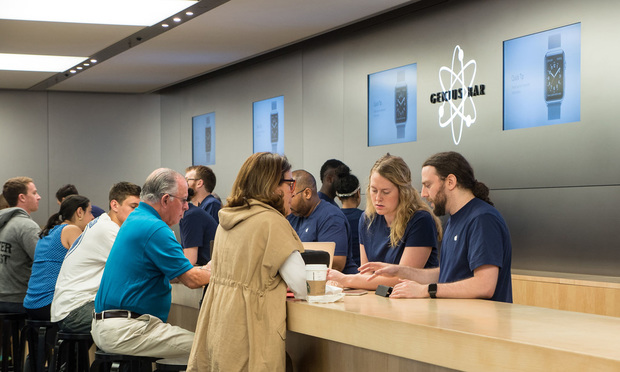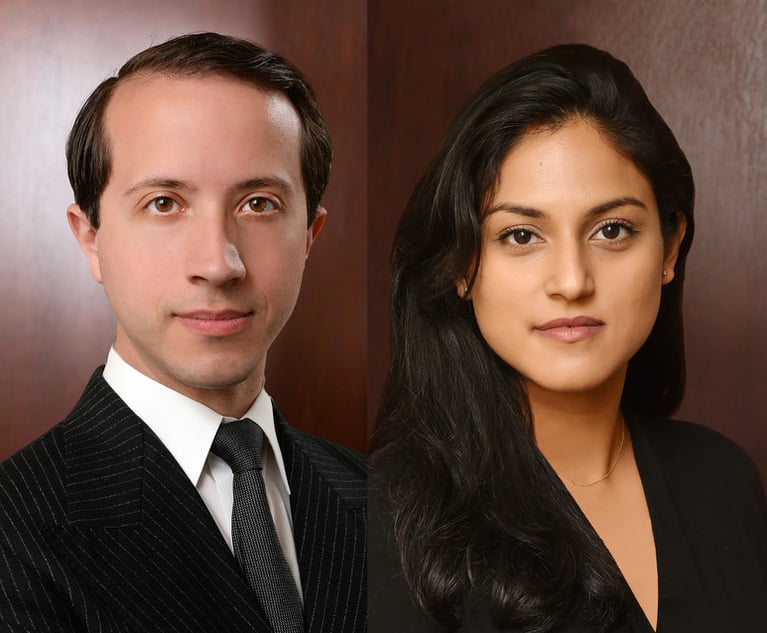Class Certified for Customers Suing Over Replacement iPhone Parts
In a Tuesday order, U.S. District Judge William Orrick granted certification of a class of Apple customers who alleged they received refurbished parts in replacement iPhones, iPads and iPods, in breach of extended warranties that promised "equivalent or new" devices.
September 18, 2019 at 07:28 PM
3 minute read
The original version of this story was published on The Recorder
 People at Genius Bar inside Apple store.
People at Genius Bar inside Apple store.
Apple Inc. will face off against potentially millions of customers after a federal judge granted certification of a nationwide class alleging that its use of refurbished parts to replace iPhones, iPads and iPods breached extended warranties that promised "equivalent or new" replacement devices.
In a Tuesday order, U.S. District Judge William Orrick of the Northern District of California in San Francisco granted class certification of the case, brought by two Apple customers who signed up to AppleCare and AppleCare+ extended warranty agreements, while refusing to toss consumer fraud and breach of contract claims on summary judgment.
"Apple's performance must match its promise, and a reasonable fact finder could rely on this evidence to conclude that it does not," Orrick wrote. "Apple struck this bargain and was obligated to deliver on its promise."
Apple and its lawyer, Purvi Patel, a partner in the Los Angeles office of Morrison & Foerster, did not respond to a request for comment.
"Judge Orrick has given a thorough and thoughtful review of our claims, and we are grateful to the court for allowing this consumer case against Apple to continue," said Steve Berman, of Seattle's Hagens Berman Sobol Shapiro, who represents the plaintiffs. "We look forward to proving our claims that Apple has been breaking its own established contracts with its AppleCare and AppleCare+ customers."
The case dates back to 2016, when two customers, Vicky Maldonado and Justin Carter, claimed Apple did not give them replacement devices "equivalent to new in performance and reliability," as promised under the AppleCare agreements.
Maldonado claimed she bought a fourth generation iPad and AppleCare extended warranty at the mall in 2013. The device began having problems, and Apple replaced it with an iPad that "functioned slowly" and "turned off unexpectedly."
Carter alleged that he paid $849 for an iPhone 6 Plus and $99 for AppleCare extended warranty. He asked for a replacement when the device began having battery issues after only a year. The replacement device also had battery problems, so he asked for a third one.
Orrick dismissed some of the claims but allowed the case to move forward.
In moving for summary judgment, Apple insisted that its warranties never promised new replacements but ensured they would be new or re-manufactured devices, which go through the same testing procedures.
"I agree with Apple that given the language of the contract, equivalent-to-new devices cannot be the same as new devices," Orrick wrote. "But plaintiffs' theory does not amount to a contention that they were entitled to new devices. Their case rests on their ability to prove that re-manufactured devices are not 'equivalent to new.'"
Orrick also rejected Apple's argument that Carter failed to retain evidence in the case because he returned his allegedly defective phones for the second and third replacements, which his lawyers at Hagens Berman inspected "for the purposes of this litigation."
He allowed certification of Apple customers who purchased AppleCare agreements starting in 2012, rejecting the plaintiffs' attempt to broaden the class to those who bought the extended warranties beginning in 2009.
Orrick oversaw a similar lawsuit filed in 2014 but, in that case, refused to certify a class and granted summary judgment.
This content has been archived. It is available through our partners, LexisNexis® and Bloomberg Law.
To view this content, please continue to their sites.
Not a Lexis Subscriber?
Subscribe Now
Not a Bloomberg Law Subscriber?
Subscribe Now
NOT FOR REPRINT
© 2025 ALM Global, LLC, All Rights Reserved. Request academic re-use from www.copyright.com. All other uses, submit a request to [email protected]. For more information visit Asset & Logo Licensing.
You Might Like
View All
How Kirkland Litigators and Restructuring Lawyers Partner on Bankruptcy Work

Litigators of the Week: Hitting Walmart With a $100M Verdict in Its Own Backyard

Litigator of the Week: Standing Strong for Under Armour's Trademarks Without Going Overboard Against Upstart Armorina

How a Luxury Designer Made the Case 'Adidas Does Not Own Stripes'
Trending Stories
- 1Chief Judge Joins Panel Exploring Causes for Public's Eroding Faith in NY Legal System
- 2Pogo Stick Maker Wants Financing Company to Pay $20M After Bailing Out Client
- 3Goldman Sachs Secures Dismissal of Celebrity Manager's Lawsuit Over Failed Deal
- 4Trump Moves to Withdraw Applications to Halt Now-Completed Sentencing
- 5Trump's RTO Mandate May Have Some Gov't Lawyers Polishing Their Resumes
Who Got The Work
J. Brugh Lower of Gibbons has entered an appearance for industrial equipment supplier Devco Corporation in a pending trademark infringement lawsuit. The suit, accusing the defendant of selling knock-off Graco products, was filed Dec. 18 in New Jersey District Court by Rivkin Radler on behalf of Graco Inc. and Graco Minnesota. The case, assigned to U.S. District Judge Zahid N. Quraishi, is 3:24-cv-11294, Graco Inc. et al v. Devco Corporation.
Who Got The Work
Rebecca Maller-Stein and Kent A. Yalowitz of Arnold & Porter Kaye Scholer have entered their appearances for Hanaco Venture Capital and its executives, Lior Prosor and David Frankel, in a pending securities lawsuit. The action, filed on Dec. 24 in New York Southern District Court by Zell, Aron & Co. on behalf of Goldeneye Advisors, accuses the defendants of negligently and fraudulently managing the plaintiff's $1 million investment. The case, assigned to U.S. District Judge Vernon S. Broderick, is 1:24-cv-09918, Goldeneye Advisors, LLC v. Hanaco Venture Capital, Ltd. et al.
Who Got The Work
Attorneys from A&O Shearman has stepped in as defense counsel for Toronto-Dominion Bank and other defendants in a pending securities class action. The suit, filed Dec. 11 in New York Southern District Court by Bleichmar Fonti & Auld, accuses the defendants of concealing the bank's 'pervasive' deficiencies in regards to its compliance with the Bank Secrecy Act and the quality of its anti-money laundering controls. The case, assigned to U.S. District Judge Arun Subramanian, is 1:24-cv-09445, Gonzalez v. The Toronto-Dominion Bank et al.
Who Got The Work
Crown Castle International, a Pennsylvania company providing shared communications infrastructure, has turned to Luke D. Wolf of Gordon Rees Scully Mansukhani to fend off a pending breach-of-contract lawsuit. The court action, filed Nov. 25 in Michigan Eastern District Court by Hooper Hathaway PC on behalf of The Town Residences LLC, accuses Crown Castle of failing to transfer approximately $30,000 in utility payments from T-Mobile in breach of a roof-top lease and assignment agreement. The case, assigned to U.S. District Judge Susan K. Declercq, is 2:24-cv-13131, The Town Residences LLC v. T-Mobile US, Inc. et al.
Who Got The Work
Wilfred P. Coronato and Daniel M. Schwartz of McCarter & English have stepped in as defense counsel to Electrolux Home Products Inc. in a pending product liability lawsuit. The court action, filed Nov. 26 in New York Eastern District Court by Poulos Lopiccolo PC and Nagel Rice LLP on behalf of David Stern, alleges that the defendant's refrigerators’ drawers and shelving repeatedly break and fall apart within months after purchase. The case, assigned to U.S. District Judge Joan M. Azrack, is 2:24-cv-08204, Stern v. Electrolux Home Products, Inc.
Featured Firms
Law Offices of Gary Martin Hays & Associates, P.C.
(470) 294-1674
Law Offices of Mark E. Salomone
(857) 444-6468
Smith & Hassler
(713) 739-1250






